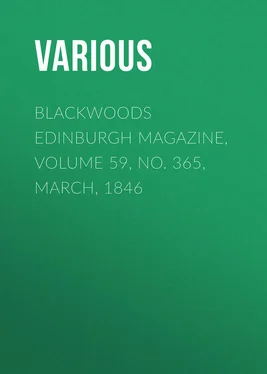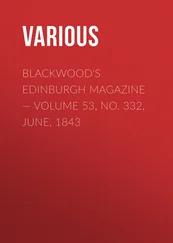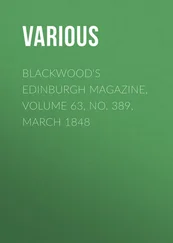Various - Blackwoods Edinburgh Magazine, Volume 59, No. 365, March, 1846
Здесь есть возможность читать онлайн «Various - Blackwoods Edinburgh Magazine, Volume 59, No. 365, March, 1846» — ознакомительный отрывок электронной книги совершенно бесплатно, а после прочтения отрывка купить полную версию. В некоторых случаях можно слушать аудио, скачать через торрент в формате fb2 и присутствует краткое содержание. Жанр: periodic, foreign_edu, Путешествия и география, на английском языке. Описание произведения, (предисловие) а так же отзывы посетителей доступны на портале библиотеки ЛибКат.
- Название:Blackwoods Edinburgh Magazine, Volume 59, No. 365, March, 1846
- Автор:
- Жанр:
- Год:неизвестен
- ISBN:нет данных
- Рейтинг книги:3 / 5. Голосов: 1
-
Избранное:Добавить в избранное
- Отзывы:
-
Ваша оценка:
- 60
- 1
- 2
- 3
- 4
- 5
Blackwoods Edinburgh Magazine, Volume 59, No. 365, March, 1846: краткое содержание, описание и аннотация
Предлагаем к чтению аннотацию, описание, краткое содержание или предисловие (зависит от того, что написал сам автор книги «Blackwoods Edinburgh Magazine, Volume 59, No. 365, March, 1846»). Если вы не нашли необходимую информацию о книге — напишите в комментариях, мы постараемся отыскать её.
Blackwoods Edinburgh Magazine, Volume 59, No. 365, March, 1846 — читать онлайн ознакомительный отрывок
Ниже представлен текст книги, разбитый по страницам. Система сохранения места последней прочитанной страницы, позволяет с удобством читать онлайн бесплатно книгу «Blackwoods Edinburgh Magazine, Volume 59, No. 365, March, 1846», без необходимости каждый раз заново искать на чём Вы остановились. Поставьте закладку, и сможете в любой момент перейти на страницу, на которой закончили чтение.
Интервал:
Закладка:
It was a vault of considerable extent, surrounded by casks of various sizes, most of which would, on being touched, have given, by their ringing sound, assurance of their emptiness. In bins, at one extremity of the cellar, were a number of bottles, whose thick mantle of dust and cobwebs spoke volumes for the ripe and racy nature of their contents. A large chest of cedar-wood stood in the innermost nook of the cellar, with raised lid, disclosing a quantity of cigars, worm-eaten and musty from extreme age. In the massive wall, forming one end of the vault, and which was in fact the foundation of the outer wall of the convent, was a large doorway; but the door had been removed, and the aperture filled with stones and plaster, forming a barrier more solid in appearance than reality. This barrier had recently been knocked down; its materials lay scattered on the ground, and through the opening thus made, came the only light that was allowed to enter the vault. It proceeded from the cell in which Paco, the muleteer, had for more than a month been imprisoned.
Long, very long and wearisome, had that month of captivity appeared to Paco. Accustomed to a life of constant activity and change, it would have been difficult to devise for him a severer punishment than inaction and confinement. The first day he passed in tolerable tranquillity of mind, occupied by vain endeavours to conjecture the motives of the violence offered to him, and momentarily anticipating his release; and although evening came without its taking place, he went to sleep, fully convinced that the next morning would be the term of his durance. Conscious of no crime, ignorant of Count Villabuena's death, and of Don Baltasar's designs, he was totally unable to assign a reason for his imprisonment. The next morning came, the bolts of his dungeon-door were withdrawn; he started from his pallet. The door opened, and a man entered, bringing a supply of fresh water and a meagre gaspacho. This he laid down; and was leaving the cell without replying to Paco's indignant and loudly-uttered interrogatories; when the muleteer followed, and attempted to force his way out. He was met by a stern "Back!" and the muzzle of a cocked blunderbuss touched his breast. A sturdy convent servitor barred the passage, and compelled him to retreat into his prison.
Paco now gave free course to his impatience. During the whole of that day he paced his cell with the wild restlessness of a newly-caged panther; the gaspacho remained untasted, but the water-jug was quickly drained, for his throat was dry with cursing. The next morning another visit, another gaspacho and supply of water, and another attempt to leave the prison, repulsed like the previous one. On the third day, however, his hopes of a prompt liberation having melted away before the dogged silence and methodical regularity of his jailers, Paco began to cast about in his mind for means of liberating himself. First he shook and examined the door, but he might as well have attempted to shake the Pyrenees; its thick hard wood and solid fastenings mocked his efforts, and moreover he had no instruments, not so much as a rusty nail, to aid him in his attempt. The two side-walls next received his attention; but they were of great blocks of stone, joined by a cement of nearly equal hardness, and on which, although he worked till his nails were torn to shreds, and his fingers ran blood, he could not make the slightest impression. As to the wall opposite to the door, he did not even examine it; for it was easy to judge, from the grass and bushes growing against the window in its top, that it was the outer wall of the convent. On this, since he could make nothing of the partition-walls, all labour would of course be thrown away; and even if he could bore through it, he must find the solid earth on the other side, and be discovered before he could possibly burrow his way out. As to the window, or rather the iron-barred opening through which came light and air, for any purposes of escape it might as well not have been there, for its lower edge was nearly fourteen feet from the ground; and although Paco, who was a first-rate leaper, did, in his desperation, and in the early days of his captivity, make several violent attempts to jump up and catch hold of the grating, they were all, as may be supposed, entirely without result.
It was the thirty-fifth day of his imprisonment, an hour after daybreak. His provisions for the next twenty-four hours had been brought to him, and, as usual, he had made an unsuccessful effort to induce his sullen jailer to inform him why he was confined, and when he should be released. Gloomy and disconsolate, he seated himself on the ground, and leaned his back against the end wall of his dreary dungeon. The light from the window above his head fell upon the opposite door, and illuminated the spot where he had scratched, with the shank of a button, a line for each day of his imprisonment. The melancholy calendar already reached one quarter across the door, and Paco was speculating and wondering how far it might be prolonged, when he thought he felt a stream of cold wind against his ear. He placed his hand where his ear had been, and plainly distinguished a current of air issuing from a small crevice in the wall, which otherwise was smooth and covered with plaster. Without being much of a natural philosopher, it was evident to Paco, that if wind came through, there must be a vault on the other side of the wall, and not the solid earth, as he had hitherto believed; and it also became probable that the wall was deficient either in thickness or solidity. After some scratching at the plaster, he succeeded in uncovering the side of a small stone of irregular shape. A vigorous push entirely dislodged it, and it fell from him, leaving an opening through which he could pass his arm. This he did, and found that although on one side of the aperture the wall was upwards of two feet thick, on the other it was not more than six or eight inches, and of loose construction. By a very little labour he knocked out half-a-dozen stones, and then, weary of thus making an opening piecemeal, he receded as far as he could, took a short run, and threw himself against the wall with all his force. After a few repetitions of this vigorous but not very prudent proceeding, the frail bulwark gave way, and amidst a shower of dust and mortar, Paco entered the vault into which he had conquered his passage.
The vault had apparently served, during some former occupation of the convent by monks, as the wine-cellar of the holy fathers; and had been walled up, not improbably, to protect it from the depredations of the French soldiery during Napoleon's occupation of Spain. As already mentioned, it was well stocked with casks of all sorts and sizes, most of them empty and with bottles, for the most part full. Several of the latter Paco lost no time in decapitating; and a trial of their contents satisfied him that the proprietors of the cellar, whatever else they might have been, were decidedly good judges of wine. Cheered and invigorated by the pleasant liquor of which he had now so long been deprived, he commenced, as soon as his eyes had got a little accustomed to the exceedingly dim twilight that reigned in the vault, a thorough investigation of the place, in hopes of finding either an outlet, or the means of making one. In the former part of his hopes he was disappointed; but after a patient search, his pains were rewarded by the discovery of several pieces of old rope, and of a wooden bar or lever, which had probably served to raise and shift the wine-casks. The rope did not seem likely to be of any use, but the lever was an invaluable acquisition; and by its aid Paco entertained strong hopes of accomplishing his escape. He at once set to work to knock down the remainder of the stones blocking up the doorway, and when they were cleared he began to roll and drag empty casks into his cell. Of a number of these, and with some labour, he formed a scaffolding, by means of which he was enabled to reach the window, taking his crowbar with him. His hand trembled as it grasped the grating, on the possibility of whose removal every thing depended. Viewed from the floor of his prison, the bars appeared of a formidable thickness, and he dreaded lest the time that would elapse till the next visit of his jailer, should be insufficient for him to overcome the obstacle. To his unspeakable delight, however, his first effort caused the grating to shake and rattle. The stone into which the extremities of the bars were riveted was of no very hard description; the iron was corroded by the rust of centuries, and Paco at once saw, that what he had looked forward to as a task of severe difficulty, would be accomplished with the utmost ease. He set to work with good courage, and after a couple of hours' toil, the grating was removed, and the passage free.
Читать дальшеИнтервал:
Закладка:
Похожие книги на «Blackwoods Edinburgh Magazine, Volume 59, No. 365, March, 1846»
Представляем Вашему вниманию похожие книги на «Blackwoods Edinburgh Magazine, Volume 59, No. 365, March, 1846» списком для выбора. Мы отобрали схожую по названию и смыслу литературу в надежде предоставить читателям больше вариантов отыскать новые, интересные, ещё непрочитанные произведения.
Обсуждение, отзывы о книге «Blackwoods Edinburgh Magazine, Volume 59, No. 365, March, 1846» и просто собственные мнения читателей. Оставьте ваши комментарии, напишите, что Вы думаете о произведении, его смысле или главных героях. Укажите что конкретно понравилось, а что нет, и почему Вы так считаете.












